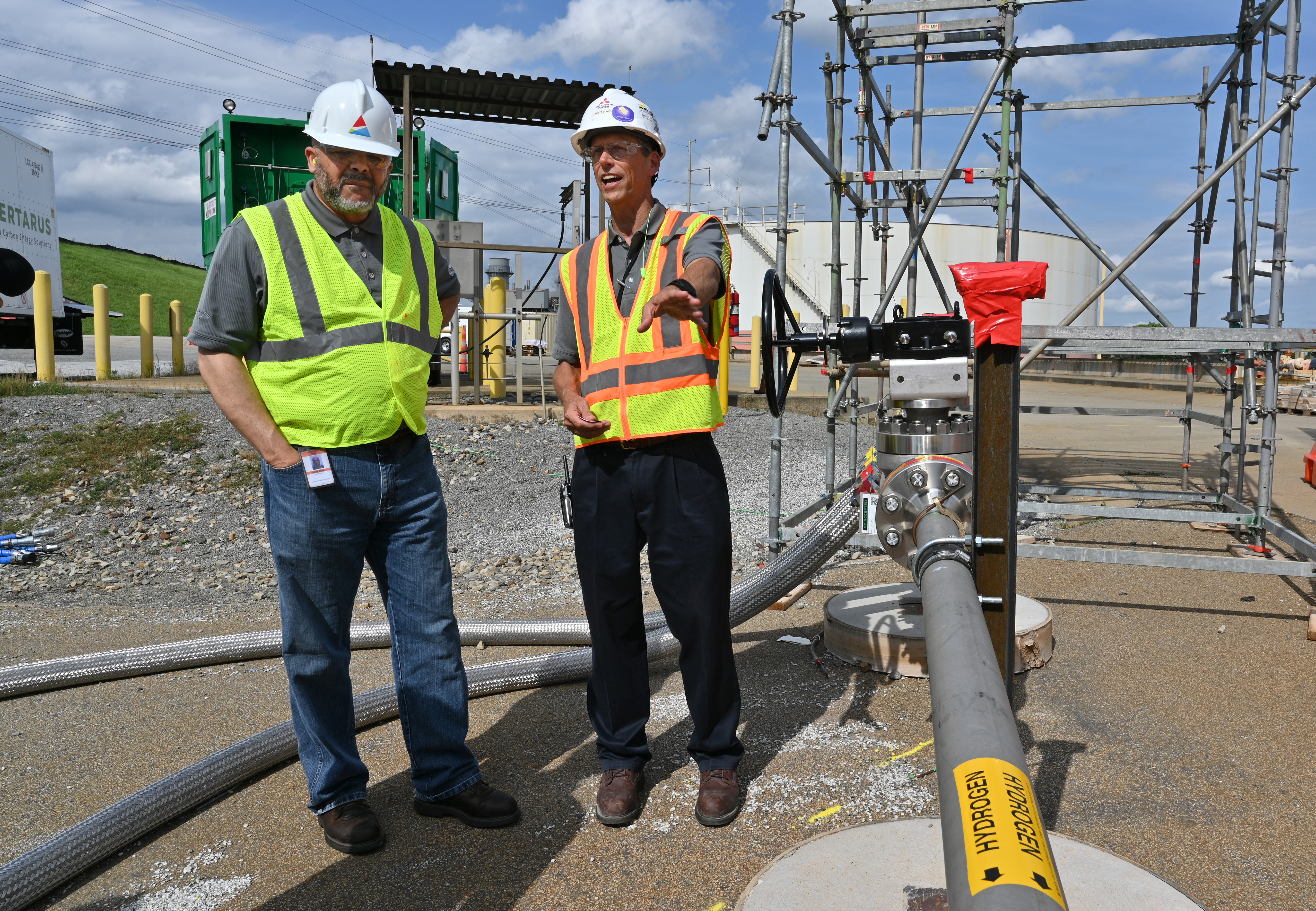The tests come as Georgia’s political, business and academic leaders are jockeying to land one of several federally-funded hydrogen hubs the U.S. Department of Energy (DOE) plans to pump billions of dollars into in the coming years.
Hopes are high that with technological advances, hydrogen can play a key role in decarbonizing the economy and helping hold climate change in check. But Chris Womack, Georgia Power’s Chairman and CEO — along with other experts — say these are still relatively early days and many hurdles remain.
“This shows us the viability and the opportunity that we have with blending hydrogen in these facilities going forward,” Womack said. “We’ll continue to safely and appropriately look at other opportunities to utilize hydrogen.”
A historic test
The hydrogen used for the tests was trucked in from Tennessee and injected through a maze of pipes. Before burning in one of the company’s Mitsubishi Power-built gas turbines, it was blended with natural gas.
During the test observed by the AJC, engineers at the plant were joined by video conference with counterparts in Japan to watch as hydrogen concentrations were gradually ramped up to roughly 15% of the overall gas mixture. In earlier tests, representatives from Georgia Power, Mitsubishi and the Electric Power Research Institute said they successfully increased hydrogen concentrations to 20%, the first time they say that’s ever been done on an advanced commercial gas turbine.
Adding hydrogen to the fuel mix also had some modest climate benefits. Emissions of the heat-trapping greenhouse gas carbon dioxide were 7% lower than they are during normal operations, when the unit is only burning natural gas, the company said.
A group of engineers from Mitsubishi Power monitor a test where hydrogen was burned using existing infrastructure at Georgia Power’s Plant McDonough-Atkinson on Wednesday, June 8, 2022. (Hyosub Shin / Hyosub.Shin@ajc.com)
Credit: HYOSUB SHIN / AJC

Credit: HYOSUB SHIN / AJC
A group of engineers from Mitsubishi Power monitor a test where hydrogen was burned using existing infrastructure at Georgia Power’s Plant McDonough-Atkinson on Wednesday, June 8, 2022. (Hyosub Shin / Hyosub.Shin@ajc.com)
Credit: HYOSUB SHIN / AJC
Credit: HYOSUB SHIN / AJC
Georgia Power said it is not currently planning any further hydrogen tests at Plant McDonough-Atkinson or any of its other power facilities.
But in another sign of its hydrogen aspirations, Georgia Power has requested to develop a hydrogen “microgrid” in its latest Integrated Resource Plan (IRP), the company’s roadmap for providing electricity for the next two decades. According to the plan, the microgrid demonstration would produce hydrogen with energy from the grid, to be used either directly as fuel in vehicles or to power a fuel cell for charging electric vehicles.
Womack said it’s possible hydrogen will be included in its plans in the future.
“The more we learn … the more we’ll consider and bring forth to our (Public Service) Commission in terms of how we integrate it into being a real part of our company,” he said.
‘We need to go to zero emissions’
From an energy production and climate change perspective, experts say hydrogen is appealing. It is plentiful, energy dense and when burned, the only byproduct is water.
But cleaning up production of hydrogen and reducing the cost remain major hurdles.
Producing hydrogen of any kind requires energy. Today, roughly 96% percent of the hydrogen produced is actually derived from fossil fuels, which still results in emissions of heat-trapping carbon dioxide and methane, an even more potent greenhouse gas.
June 8, 2022 Smyrna – Mark Berry (left), vice president of environmental and natural resources for Georgia Power, and Scott Cloyd, chief engineer at Mitsubishi Power, talk at Georgia Power’s Plant McDonough-Atkinson, on Wednesday, June 8, 2022. Georgia Power conducted successful tests blending hydrogen with natural gas using existing infrastructure at the power plant. (Hyosub Shin / Hyosub.Shin@ajc.com)
Credit: HYOSUB SHIN / AJC

Credit: HYOSUB SHIN / AJC
June 8, 2022 Smyrna – Mark Berry (left), vice president of environmental and natural resources for Georgia Power, and Scott Cloyd, chief engineer at Mitsubishi Power, talk at Georgia Power’s Plant McDonough-Atkinson, on Wednesday, June 8, 2022. Georgia Power conducted successful tests blending hydrogen with natural gas using existing infrastructure at the power plant. (Hyosub Shin / Hyosub.Shin@ajc.com)
Credit: HYOSUB SHIN / AJC
Credit: HYOSUB SHIN / AJC
Hydrogen can also be produced through electrolysis, a process that splits water molecules into hydrogen and oxygen. But that also requires energy.
Sourcing the energy needed for production from renewables, like solar, and keeping the cost down for this so-called “green hydrogen,” is a key goal of the Biden administration.
Last year, the Biden administration announced the “Hydrogen Shot,” a federal initiative aiming at reducing the cost of green hydrogen by 80% in a decade. And this week, the U.S. DOE also unveiled plans to develop a network of hydrogen hubs to explore using hydrogen for industrial, residential and transportation uses. A group of political, business and academic leaders from Georgia, led by U.S. Sen. Jon Ossoff, wants to bring one of those hubs to the Peach State.
Georgia Tech scientists also are exploring new processes and materials to improve the efficiency of hydrogen production.
“We need to go to zero (greenhouse gas) emissions and the hydrogen economy can be a strong candidate to replace it,” Jinho Park, a scientist at the Georgia Tech Research Institute involved in hydrogen solutions research. “Not totally replace it, but it can play a part.”
A note of disclosure
This coverage is supported by a partnership with 1Earth Fund, the Kendeda Fund and Journalism Funding Partners. You can learn more and support our climate reporting by donating at ajc.com/donate/climate/
Read More:Georgia Power tries burning hydrogen as it seeks fossil fuel alternatives
2022-06-10 21:11:55
